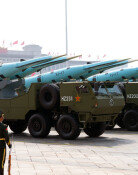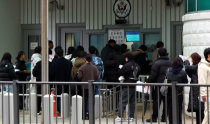‘K-Chips Act’ gets passed to offer mere 8% tax reduction
‘K-Chips Act’ gets passed to offer mere 8% tax reduction
Posted December. 24, 2022 09:13,
Updated December. 26, 2022 08:21
The Korean National Assembly passed, during the regular session on Friday, a budget bill dubbed as "K-Chips Act" that offers an 8% tax reduction for the amount used in expanding facilities by a large company investing in the nation's major strategic technology areas such as semiconductors or batteries. The key purpose of the Act is to support Korean companies through tax reduction for semiconductor facilities investment so that they do not lag behind their competitors from Taiwan, the U.S., and China. The problem is that the 8% falls way short, not even half, of the original target the lawmakers were supposed to meet.
The ruling People Power Party has been working to enhance the tax reduction rate by the year 2030 for semiconductor facilities investment to 20% for large companies, 25% for medium-sized companies, and 30% for small-to-medium-sized enterprises (SMEs) from the current 6%, 8%, and 16%, respectively. However, after a lengthy gridlock with the opposition party, which insisted 10%, 15%, and 30%, respectively, the ruling party ended up determining the ratios much lower than the target with only the percentage for large companies increased by 2 percentage points. Reportedly, the assessment by the Ministry of Economy and Finance greatly influenced the final decision which analyzed that the corporate tax revenue for 2023 would decline by around 2.7 trillion Korean won if the original budget plan gets passed. The passage of the bill overshadowed the remarks by President Yoon Suk Yeol who said that Korean companies going into the global competition should be fully prepared and properly supported.
The tax benefits offered in the K-Chips Act pale compared to those offered by other nations to their chip makers. The U.S., which passed the CHIPS and Science Act this year, offers a tax cut of 25% for the investment amount made by a company, regardless of its size, that builds a semiconductor plant in the country. Taiwan is poised to pass a bill raising the tax deduction rate from 15% to 25% for R&D investment by its chip manufacturers. China offers tax benefits for the total amount invested in semiconductors.
Korea's highest corporate tax rate, which was lowered by a mere 1 percentage point to 24%, would also negatively impact Korean firms. The U.S. applies a single corporate tax rate of 21%, while Taiwan imposes only 20% with no additional local taxes. Last year, corporate taxes paid by Samsung Electronics and SK hynix were 11.3 billion and 3.2 billion dollars, respectively, topping the chart, followed by Taiwan's TSMC, which paid 2.4 billion, and America's Intel at 1.8 billion dollars.
Unfortunately, Korea's major companies had to go into the global battlefield under much poorer conditions and heavier burdens than their competitors next year. Korea's unfavorable tax system would likely be a major obstacle in attracting key global companies providing semiconductor equipment and materials. Party politics and the government's short-sighted interest in tax revenue led to this penny-wise and pound-foolish situation, compromising our future economy and national competitiveness.



![화장실 갇혔을 때 생존법…“최후에는 변기뚜껑” [알쓸톡]](https://dimg.donga.com/c/138/175/90/1/wps/NEWS/IMAGE/2025/12/26/133042007.3.png)

![보일러 풀가동해도 춥다?…난방비 폭탄 범인은 ‘이것’ [알쓸톡]](https://dimg.donga.com/c/138/175/90/1/wps/NEWS/IMAGE/2025/12/24/133029046.3.png)

